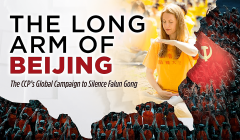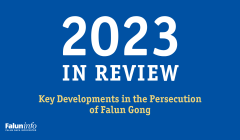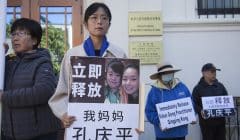New Report: In Covering Falun Gong, New York Times Distorts, Ignores, and Maligns

New York Times headquarters (vacant) / Adobe Stock
New York—The New York Times has repeatedly failed to cover atrocities against Falun Gong, while amplifying Chinese Communist Party (CCP) propaganda about the community, with devastating results, according to a report published today by the Falun Dafa Information Center. These problems have increased over time, leaving readers with a severely slanted understanding of Falun Gong and the persecution faced by believers in China.
The detailed study, which analyzed 159 New York Times articles dating back to 1999, found that the agenda-setting newspaper has significantly and irresponsibly distorted the story of Falun Gong, be it in terms of the nature of the practice or the scope of the persecution. The coverage is riddled with factual errors, has uncritically internalized key aspects of the CCP’s framing of the campaign, and has largely been silent on the rights abuses facing Falun Gong practitioners since 2002. This despite the fact that documented deaths have climbed and a plethora of third-party research has affirmed ongoing and massive violations.
“Like many Americans, the New York Times was a staple of our household growing up. For 25 years, however, its reporting on Falun Gong has been egregiously and repeatedly disappointing. The image of Falun Gong that emerges from these articles is at complete odds with the lived reality of practitioners and evaluations of experts on Chinese religion,” says Levi Browde, the executive director of the Falun Dafa Information Center. “With this research, we hoped to better understand and expose these problems, which constitute one of the most serious failures of international reporting on China in this century.”
The paper’s problematic coverage began almost immediately, with 76 percent of news articles from 1999 to 2002 carrying inaccurate and negative descriptions of Falun Gong, while parroting CCP claims to have handily “crushed” Falun Gong in China. By contrast, during this time, other major papers like the Wall Street Journal and Washington Post produced ground-breaking investigations and award-winning journalism about the human toll the crackdown was taking.
The Times’ apparent internalization of the regime’s propaganda and framing of the Falun Gong story has subsequently been reflected in extremely limited coverage of the rights abuses facing Falun Gong practitioners in China. Indeed, the Times has not published a news story focused on rights abuses facing Falun Gong practitioners in China since 2016, even as these violations continue on a large scale.
The paper ignored major reports by human rights groups and the 2019 London China Tribunal on forced organ harvesting, as well as ongoing high-profile individual cases of prison sentences and deaths in custody. At least one former Times journalist reported being barred by editors from investigating organ transplant abuses against prisoners of conscience in China, after editors accepted Chinese government assurances of ending transplants from prisoners and claimed Falun Gong practitioners were “irrational” and “unreliable.”
The Times’ reporting on Falun Gong has only become more distorted with time. In recent years, alongside complete silence on rights abuses facing Falun Gong practitioners, the few articles that the paper has published on Falun Gong have been openly hostile, targeting organizations founded by practitioners. These negative articles repeat prior inaccuracies, incorporate new ones, and in practice, serve the CCP’s goals of maligning Falun Gong and stymying the party’s critics.
“We must not underestimate the impact of the Times’ distorted reporting,” says Browde. “Its irresponsible treatment of Falun Gong practitioners as ‘unworthy victims’ has robbed innocent people suffering brutal violations of international support, undoubtedly resulting in greater suffering across China. But the Times’ silence on Falun Gong has also deprived policymakers and businesses of critical information for navigating today’s China.”
At the same time, the Chinese regime has benefited immensely from the Times’ coverage, gaining traction for its agenda to marginalize Falun Gong and obscure the crackdown against it, while also providing credibility to anti-Falun Gong propaganda domestically and globally. Meanwhile, the Times has most likely avoided far more severe penalties from the Chinese regime by taking a hands-off approach to reporting on the CCP’s systematic campaign of religious persecution against Falun Gong.
Read the full report here.
To interview the report authors or request a private briefing, email [email protected].








